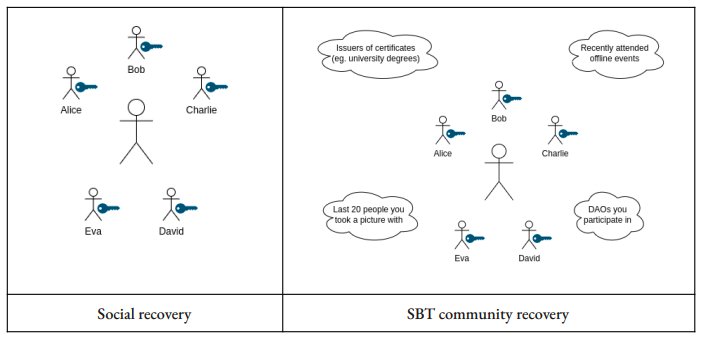Soulbound Tokens (SBTs) have been touted as tokens that might eventually change humanity. Ethereum co-founder Vitalik Buterin recently co-wrote a 37-page paper explaining how Ethereum’s future will revolve around an ecosystem known as a “Decentralized Society: Finding Web3’s Soul”.
Buterin together with his fellow authors expounded on their vision for a future decentralized society (DeSoc) that will eventually thrive on Soulbound Tokens (SBTs). SBTs have formed an integral part of this theoretical future that will be available this year.
Analysts say that the name is possibly derived from the World of Warcraft’s “soulbound items,” which Buterin has praised in the past. SBTs are non-fungible tokens (NFTs) that an individual can earn partially based on their job and education history.
Unlike the normal NFTs, SBTs are non-transferable, although people can revoke them if they want to. They represent a person’s reputation and accomplishments, working as a type of ‘extended resume’ according to Buterin.
The idea behind the Soulbound tokens is to boost people’s social identities by carefully customizing them with distinct and non-exchangeable badges. Theoretically, these tokens may help in resolving some of the issues affecting decentralized finance, including theft and scams.
College Degrees And ‘Souldrops’
There are several ways that we could use the tokens in real life, as highlighted in the paper. Suppose colleges and universities began issuing degrees as soulbound tokens, employers started giving SBTs to workers, and event organizers give out SBTs to attendees.
These credentials could make it highly challenging for scammers and criminals to impersonate anyone. On the other hand, it would make it easier for prospective employers to authenticate the history and training of an individual when considering hiring.
The tokens might also help Decentralized Autonomous Organizations (DAOs), or groups without a singular or hierarchical leader, more easily summon the members for a particular cause or event. For instance, an environmentally-minded DAO could airdrop SBTs to people that already have some environmental action SBTs as a recruitment strategy. Buterin has referred to them as ‘souldrops.’
An individual’s SBTs would then get validated by the other ‘souls,’ or people who can authoritatively vouch for you and the credential or accomplishment that you are earning a token for, just like the way a LinkedIn connection can validate your skills. All of that information would be stored in a wallet on the blockchain, not like the software wallets that are used for crypto and nonfungible tokens currently.
Related: Blockchain could help colleges like ASU provide better, more secure online education
What’s the point?
Based on Buterin and his co-authors, soulbound tokens could particularly help in pushing Web3 forward by minimizing reliance on centralized firms and giving people extended ownership of their digital identities.
Nonfungible token artists are mostly compelled to rely on centralized places like OpenSea and Twitter to sell their work, as highlighted in the whitepaper. In that context, most of the users depend heavily on software wallets that are controlled by firms like Coinbase instead of truly decentralized wallets.
Soulbound tokens could also help in distributing some of the majorly wealth-obsessed aspects of cryptocurrency culture that have infringed upon what the enthusiasts say is the actual decentralized movement.
Notably, NFTs are transferable and anyone who owns them can sell them to others. For instance, in case colleges awarded degrees in the form of NFTs, they can theoretically also sell them online to individuals who never attended college and completed their programs.
But, this risk is theoretically decreased using the soulbound tokens which makes it more challenging for people to purchase their achievements and status. According to Buterin’s January post discussing World of Warcraft’s soulbound items:
“Making more items in the crypto space ‘soulbound’ can be one path toward an alternative, where NFTs can represent much more of who you are and not just what you can afford.”
What Are Soulbound Tokens And How Do They Work?
Soulbound tokens are NFTs that work like real-life achievement badges similar to what you get in a video game once you complete a specific task or clear a milestone. But instead of getting these badges for getting your character to a maximal level, Buterin sees them as a means of proving your employment history, education achievements, and other IRL skills.
SBTs are primarily your resume on the blockchain. Anybody can say that they went to Havard by marking it as their alma mater on Facebook. However, with soulbound tokens, Harvard’s “Soul” (their wallet) would need to grant your “Soul” an SBT of a diploma for you to have a chance to make that claim.
These tokens can be distributed amongst the members of a group or institution to work as proof of affiliation. Writers, artists, and creatives may also use SBTs as their digital portfolios. Even when it is for something as niche as being the global leading expert on fingerboarding, your corresponding SBT would work as a means of validating all these achievements to other people.
This makes it almost impossible for people to make false claims and display fake credentials. The paper stated:
“The tokens could help solve some of the problems ravaging decentralized finance, like scams and theft.”
That is where Buterin and his co-authors believe the real power of the mechanism thrives. Unlike the traditional nonfungible tokens, SBTs will be non-transferable which guarantees that they cannot be achieved through trade. Nonetheless, users can revoke their soulbound tokens upon request.
What Happens When You Lose Your Soul?
What happens if your Soul wallet is hacked or you happen to lose your Soul address? With thefts rampantly dominating the NFT community, it is crucial to have strong and functional safeguards or contingencies set in place to stop criminals from taking identity theft to an entirely new and higher level.
Related: Binance Partners With IdentityMind for Enhanced Compliance and Security
Vitalik Buterin proposed community-wide adoption of the social recovery model to help in preventing any cases of soulbound tokens theft. Through social recovery, the users can appoint people and institutions as ‘guardians’ who can access and change the private keys to their wallet if and when it gets compromised.
Nevertheless, a person would be hard-pressed to recover stolen SBTs in case the people they choose as guardians pass away or in case their relationship breaks down. By granting a bigger community the ability to help in the recovery process, Buterin thinks that SBTs will be easily retrieved upon theft.
Using this model, the authors write:
“Recovering a Soul’s private keys would require a member from a qualified majority of a (random subset of) Soul’s communities to consent.”

What Will SBTs Be Used For?
Apart from representing personal information and making it challenging for scammers to impersonate people, these tokens are designed with other utilities. Since they are non-transferable, they may be used to create exclusive airdrops (souldrops), for event ticketing, and to track credit scores.
It may sound intimidating and even somewhat dystopian, with some people comparing Soulbound tokens to China’s concept of creating a social credit system. The authors recognize this in their paper, stating that a database of SBTs may offer a market to:
“Automate red-lining of disfavored social groups or even target them for cyber or physical attack, enforce restrictive migration policies, or make predatory loans.”
That is one of the reasons why users can choose to revoke their SBTs upon request and even hide them from the public when necessary. Nonetheless, if these soulbound tokens are rolled out, the world will not descend into chaos as some naysayers suggest. Instead, SBTs are expected to work as safeguards against what is affecting Web3 in general: scams.
Related: The World’s Most Infamous Crypto Hacks and Scams
Currently, mostly within the NFT space, reputation plays an integral role in the amount of trust that the community members are ready to invest in a project. That has happened repeatedly, such as the time when the Azuki collection reached record-low floor prices after the history of its creator in the NFT space was revealed.
With soulbound tokens, the Web3 community can check for themselves if a project’s developer can be trusted. Thus, the community can make more informed decisions on what projects they would want to support.
What If A User Wants To Migrate Their SBTs From One Wallet To Another?
There are several simple technical options available to migrate the tokens according to Vitalik:
- Store the SBTs at an address that is the hash of (i) an index (ii) the recipient’s address and (iii) a secret that belongs to the recipient. You can show your secret to an interface that then scans for all possible items that belong to you, but nobody without your secret may see what items are yours.
- Publish a hash of a bunch of digital items, and give every recipient their Merkle branch.
- In case a smart contract requires a check if you own an item of some type, you can give a ZK-SNARK.
Transfers may be done on-chain, but the simplest method might be a transaction that contacts the factory contract to make the old item invalid and the new item useable, utilizing a ZK-SNARK to prove the validity of the operation.
According to Buterin, the transferability mainly shows Web 3.0’s money orientation and how it might eventually damage the next generation’s long-term sustainability. Although some advantages come with buying and selling NFTs, like supporting charities and artists, the shortcomings also need to be considered.
Applying the SBT abilities to NFTs would initially take lots of time and work. But, it might help in opening a bigger door to blockchains becoming the centers of ecosystems that are entertaining and collaborative, and it will not be all just about money.
When Will SBTs Be Available?
According to Jason Levin, who managed to interview the paper’s co-author, E. Glen Weyl, SBTs could be available at least by the end of 2022.
I interviewed paper co-author @glenweyl.
He predicts that SBTs will be available for early uses by the end of 2022.
He also said, "I suspect the 2024 up cycle will focus on them."
But, wait – what's the point of NFTs that can never be transferred?
Here's 3 use cases.
— Jason Levin (@iamjasonlevin) May 19, 2022
But, this is just for ‘early uses,’ which means that it will take some time before we see the DeSoc that Buterin explained in his paper. To reach these levels, is expected to be a community-wide effort.









